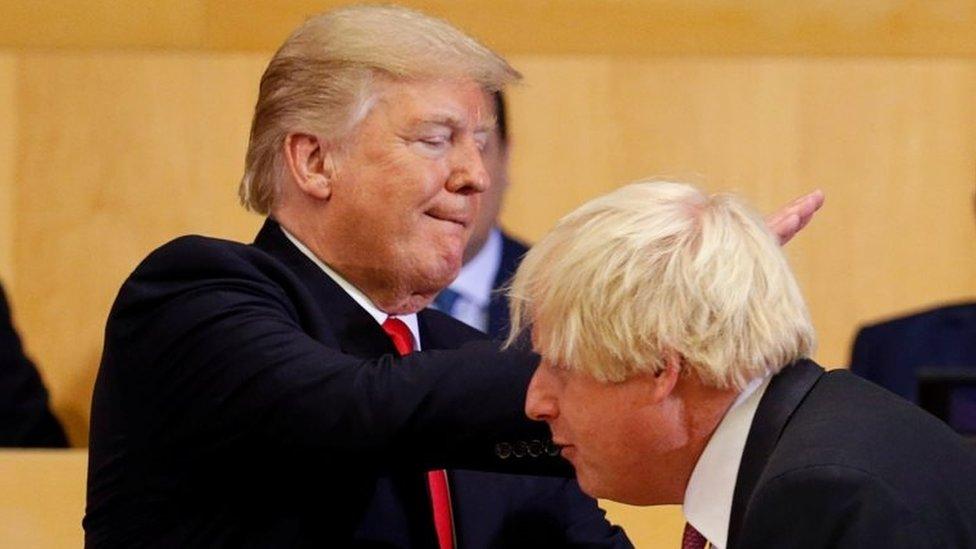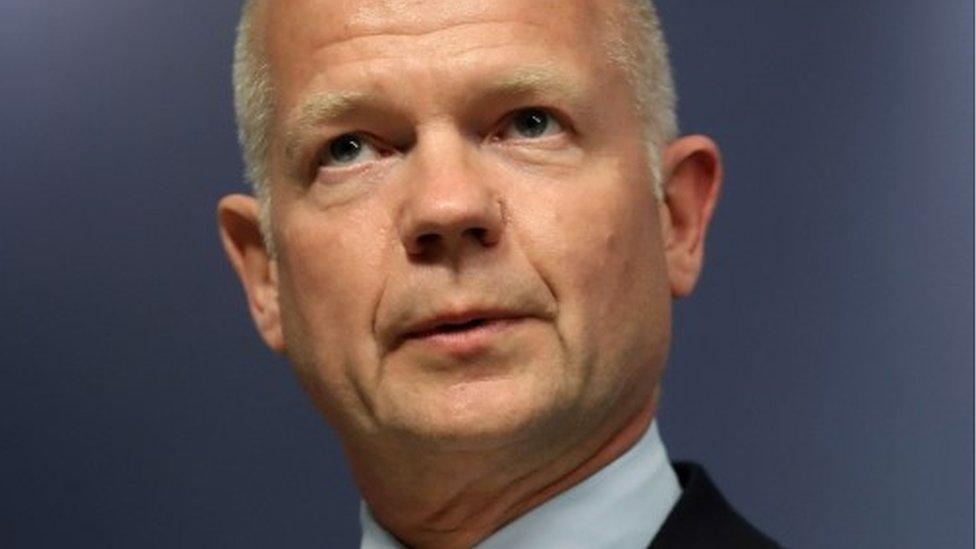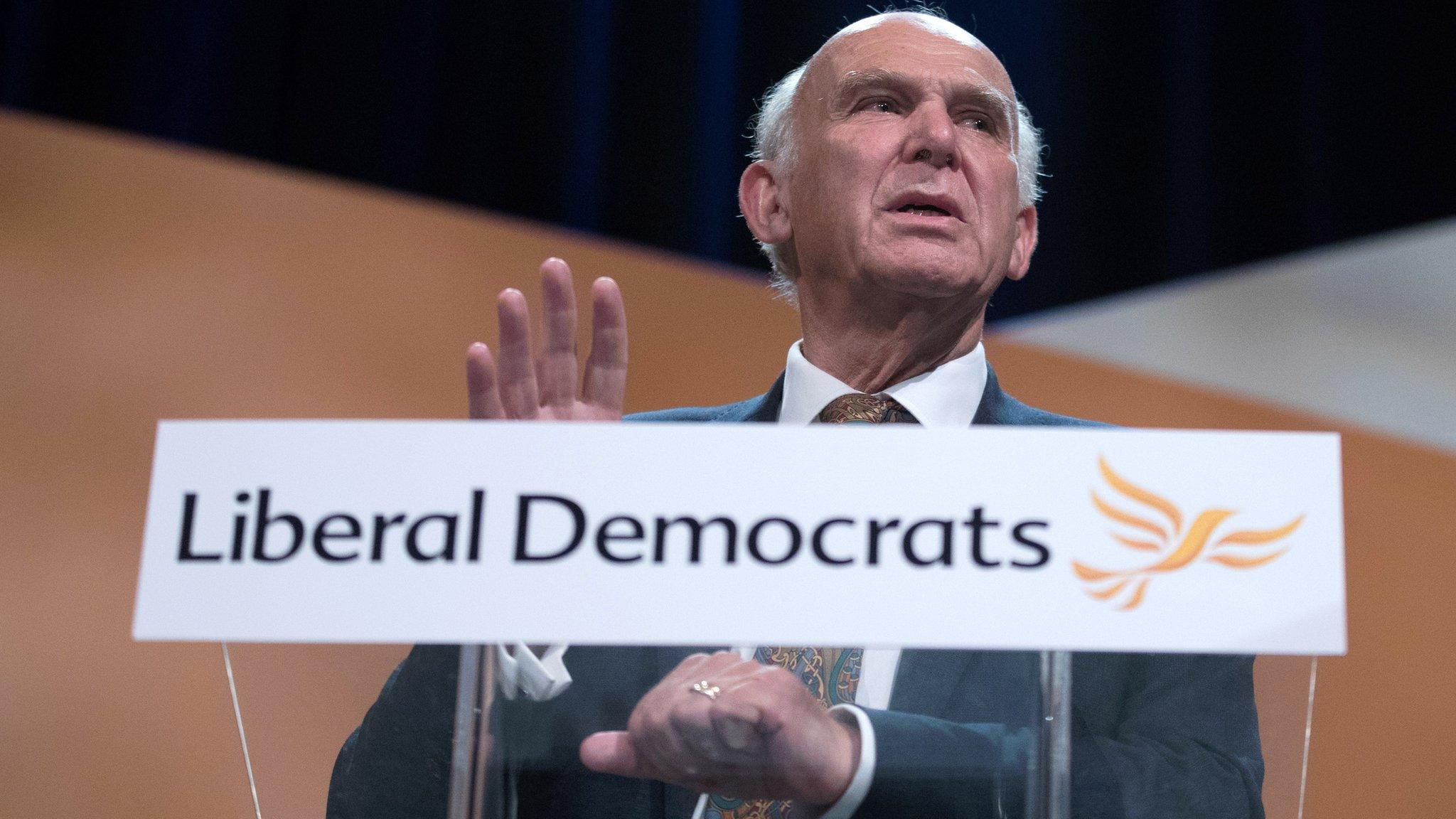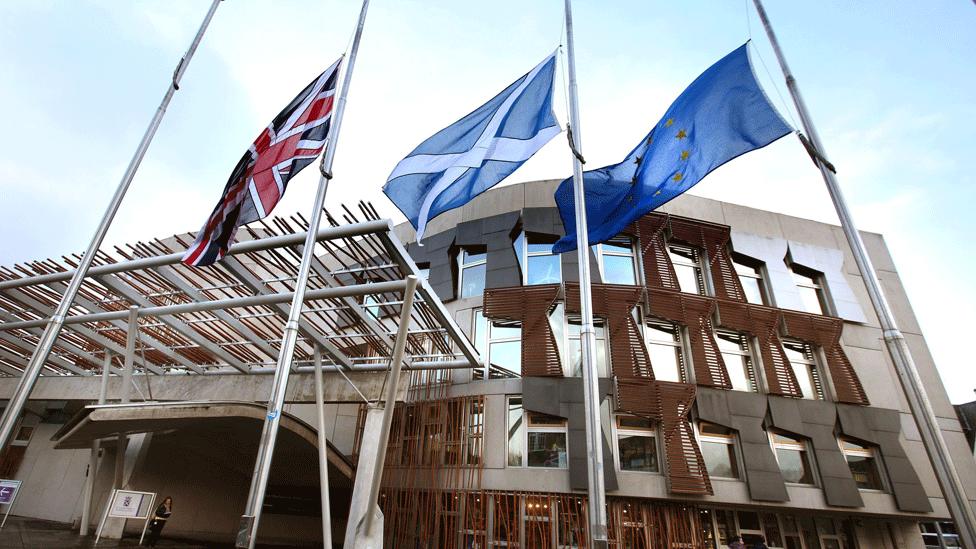Boris Johnson denies cabinet Brexit split
- Published
- comments
Boris Johnson ambushed by press pack
Boris Johnson says the government is "working together" and that he will not be resigning after criticism of his intervention on Brexit.
The foreign secretary has been accused of undermining Theresa May with a 4,000-word article, external setting out his own post-EU vision.
But he told journalists the government was "a nest of singing birds".
Mr Johnson - along with other ministers - is due to attend the PM's Brexit speech in Florence on Friday.
Asked about his article, Mrs May said she was "getting on with the job" of delivering Brexit.
Earlier the foreign secretary was accused by ex-chancellor Ken Clarke of making a pitch for a future Tory leadership election with his article.
Mr Clarke said that "in normal circumstances" Mr Johnson would have been sacked. Some reports have claimed Mr Johnson will resign if his blueprint for Brexit is not followed.
But speaking in New York, the foreign secretary said "of course not" when asked whether he was going to quit, and predicted the government would "deliver a fantastic Brexit".
Asked whether there was a cabinet split on Europe, Mr Johnson said: "No, we are a government working together.
"We are a nest of singing birds."
Theresa May asked about Johnson's intervention on Brexit
Mr Johnson and Mrs May are both attending the United Nations General Assembly in New York.
Asked repeatedly about Mr Johnson and reports of cabinet disunity over Brexit, the PM stressed that the government was united in trying to get the best possible deal.
"What I think the majority of the British public want to see is what we're doing, which is getting on with the job of those negotiations with the European Union and getting on with the job of the best deal for the UK," she told the BBC.
Responding to questions about the so-called divorce bill for the UK to pay on leaving the EU, she said the UK was a "law-abiding nation" and would "stand by our obligations" as well as carrying on contributing to programmes it wants to be a part of after Brexit.
Mr Johnson's article said the UK should not pay for access to the EU single market.
Kenneth Clarke calls Boris Johnson's Brexit article an "irrelevant nuisance" on Radio 4's Today
The continuing fallout from the article - published in Saturday's Telegraph - led, on Monday, to Mrs May having to rebut claims that Mr Johnson was trying to become a "back-seat driver" in her cabinet.
The PM, who is due to set out her vision for Brexit in a speech in Florence on Friday, declared: "This government is driven from the front."
Speaking on BBC Radio 4's Today programme, Mr Clarke said that in her speech Mrs May had to set out "for the first time, really" what the UK can "can realistically achieve in negotiations".
That must include "free access to the European market and no new barriers for our trade," he argued, and how best "to avoid economic damage to the country".
"Alongside that, personal publicity and campaigning by the foreign secretary is actually just an irrelevant nuisance."
Theresa May is making a big Brexit speech in Florence. But why do it there?
Mr Clarke said: "Sounding off personally in this way is totally unhelpful and he shouldn't exploit the fact she hasn't got a majority in Parliament.
"He knows perfectly well that normally the foreign secretary would be sacked for doing that - and she, unfortunately, after the general election, is not in the position easily to sack him - which he should stop exploiting."
He also attacked Mr Johnson for repeating "one of the more simplistic and dishonest arguments of the hardline Leavers" in his article - a reference to "taking back control" of £350m a week after Brexit.

Mr Johnson met US President Donald Trump at the UN on Monday
The foreign secretary said on Monday that his article was meant to be an "opening drum roll" for the PM's speech.
"Because I was involved in that Brexit campaign, people want to know where we are going," he added.
Mrs May attempted to avoid a public row with her foreign secretary, telling reporters travelling with her on a trade mission to Canada: "Boris is Boris."

Lord Hague is concerned about cabinet disunity over Brexit
Former foreign secretary, Lord Hague, writing in the Daily Telegraph, external, warned that disunity over Brexit could hand power to Jeremy Corbyn's Labour Party.
He wrote: "It is putting it a bit too politely to say, in the wake of Boris Johnson's article in this newspaper on Saturday, that the approach of senior ministers to the Brexit negotiations appears to lack co-ordination.
"More bluntly, it is now 15 months since the referendum, and high time that all members of the government were able to express themselves on this subject in the same way as each other, putting forward the same points, as part of an agreed plan."
- Published19 September 2017

- Published19 September 2017

- Published18 September 2017
- Published30 December 2020
